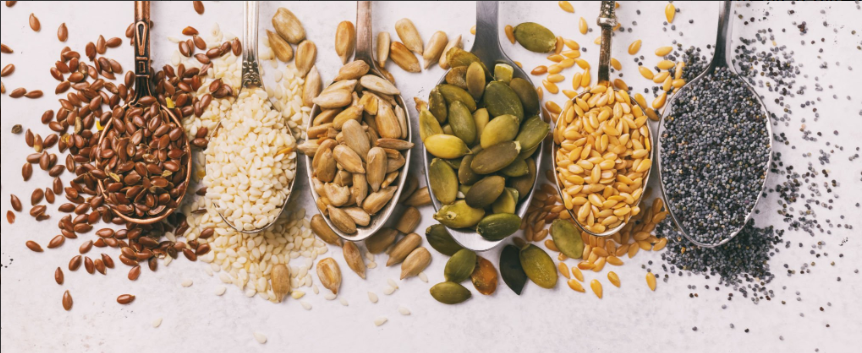What is seed cycling?
Basically seed seed cycling is a practice when you eat specific seeds during two phases of your menstrual cycle. To begin with the follicular and luteal phases to promote a healthy balance of estrogen and progesterone levels. It’s a gentle and a natural way of reducing PMS symptoms, improve fertility and help simulate menstruation. It is also helpful with other symptoms such as hormonal imbalance.
Beyond menstrual cycle post menopausal, seed cycling can be use at different stages of a women’s life. Understanding seed cycle better. There are two phases follicular phase begins the first day of your menstrual bleeding until the ovulation. Which typically last around 14 days. The second phase starts at ovulation until your next menstruation
There is a rise in estrogen level during the first half of the cycle, and during the second half of the cycle progesterone level rise while estrogen level slowly decline. An imbalance between estrogen and progesterone can contribute to PMS symptoms, menstrual cramps, acne, short luteal phases and regular cycle.
Seed cycling for fertility
Moreover, seed cycling is based on the idea of influencing hormone levels through specific seeds, which may be beneficial for fertility. Flax seed in the first half of the cycle (follicular phase) may help regulate estrogen, promoting healthy follicle development for egg maturation.
Pumpkin seeds in the second half (luteal phase) might support progesterone production. Which prepares the uterine lining for implantation. Balanced hormones are essential for various aspects of reproduction.
Additionally, seeds like flax seed and sesame seeds contain anti-inflammatory properties, which might be helpful for fertility as inflammation can impact implantation. It’s important to note that while these potential benefits sound promising. More research is needed to confirm the effectiveness of seed cycling for improving fertility cycle.
Seed cycling for PCOS
Here the theory is that eating particular seeds at particular times. Throughout your menstrual cycle might affect your hormone levels. In the luteal phase of the cycle, which is the second half, pumpkin seeds may promote the synthesis of progesterone. While flax seed may aid in the regulation of estrogen in the follicular phase. Maintaining hormone balance is essential for controlling PCOS symptoms.
How to incorporate
Seed cycling is a straightforward practice to implement into one’s daily routine. The general guideline is to consume 1-2 tablespoons of the recommended seeds per day, either raw or ground up. These seeds can be easily incorporated into your normal diet in various ways – sprinkled on meals, mixed into yogurt or smoothies, or added to salad bowls. The specific seeds to eat depend on which phase of the menstrual cycle you are in, with flax and/or sesame seeds for the follicular phase, and pumpkin and/or sunflower seeds for the luteal phase. The flexibility in preparation and incorporation makes seed cycling a convenient and accessible practice to support hormonal balance throughout the monthly cycle.
Nutrients you get from seed cycling
-
-
Flax seeds :
Rich in omega-3 fatty acids, fiber, and lignans (plant compounds with potential health benefits).
-
Pumpkin seeds :
A good source of zinc and magnesium.
-
Sesame seeds:
A good source of calcium, magnesium and healthy fats
-
Sunflower seeds:
A good source of vitamin E, selenium
Conclusion
In conclusion, seed cycling is a natural approach that involves consuming specific seeds during the different phases of the menstrual cycle to help promote hormonal balance. The theory behind it is that the nutrients in these seeds can support the rise and fall of estrogen and progesterone levels throughout the cycle.
Seed cycling may offer potential benefits for managing PMS symptoms, regulating the menstrual cycle, and even improving fertility and PCOS symptoms. However, more research is still needed to conclusively confirm the effectiveness of this practice.
Nonetheless, incorporating seed cycling can be a gentle and holistic way for women to support their reproductive health, as the seeds provide a variety of beneficial nutrients. As with any new health practice, it’s important to consult with a healthcare provider, especially for those with underlying medical conditions, to ensure it is suitable and safe for your individual needs.
-



1 Comment
Low calorie food: successfully following the lifestyle
April 5, 2024[…] they can assist in establishing a deficit that is both safe and sustainable.Recall that losing weight in a healthy way is a marathon, not a […]